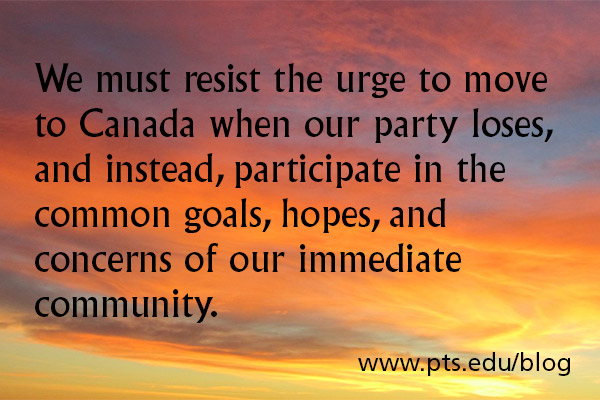Like many of you, I stayed up late on election night watching polls and listening as pundits prognosticated ‘what it all means.’ I confess that I have spent most of my free time since Tuesday night reading columns on the right and the left, digging through the sudden avalanche of anxieties projected by ‘Red’ America, ‘Blue’ America, and our neighbors to the North and South. We talk about the way the candidates awaited election results in their respective ‘war rooms,’ while narrating the ‘uprising’ of blue collar workers that ‘upended’ established elites.
Such talk filters through religious groups as well. We now watch religious conservatives and evangelicals gloat over a country reclaimed, while the various constituencies of the religious left strategize methods to ‘take back’ the country from conservatives. In describing the election, our metaphors betray violence in the political class and on the city streets, in rural America and in the reality-warping enclaves of political media. War rooms and uprisings that ‘take back’ the country normalize political bloodsport and invest us in a winner-takes-all, zero-sum contest in which power becomes the only horizon which matters. In the meantime, we lose the politics of neighborliness, of welcoming strangers and seeking common cause across difference in our communities.
The church of Jesus Christ ought to know better. We gather in buildings and homes, storefronts and gymnasiums, cathedrals and parks across the United States every week to confess faith in the resurrection of the crucified one. Yet, we fail to inhabit the political consequences of this confession, preferring instead to compete in the bruising quest for political control as either ‘values voters’ or ‘progressives.’
For all our intention to ‘change culture’ by pulling the levers of power, we find ourselves ambivalent to the gospel. Reconciliation? Sure, as long as it is on my terms or represents ‘the real’ America. In To Change the World, James Davison Hunter calls for the renewal of Christian public life by revealing our problematic lust for cultural power. Culture, Hunter insists, cannot be changed by winning an election or even winning arguments. To use the language of Charles Taylor, culture describes a social imaginary produced by the interplay of stories, symbols, practices, and institutions. Hunter insists our quest to ‘take back’ the culture is both a fool’s errand and theologically problematic.
Instead, Hunter calls the church to a politics of “faithful presence within,” which invites the church to turn from our will to power and “yield [our] will to God” so that we might learn to “nurture and cultivate the world where God has placed [us].” In practice, this means taking a vow of stability and joining ourselves to the places and people God has sent us. Yes, Hunter wants us to resist the urge to move to Canada when our party loses, and instead, to participate in the common goals, hopes, and concerns of our immediate community. Practices of faithful presence cultivate trustworthy relationships wherever God has us; they enable us to bear witness to the trustworthy Creator we know in the Son.
Where do we start? In his book Culture Making, Andy Crouch describes the public shape of our Christian vocation as artist and gardener. Both the artist and gardener begin their work with careful attention to a particular place or subject and work creatively with materials, people, and traditions/ideas to invoke meaningful experiences and cultivate community. In their work, the artist and gardener steward what is good and meaningful in a time and place. Like the small business owner in my neighborhood hosting a free taco night to draw the community together post-election, the artist evokes something new and the gardener tends to relationships. Rather than ‘take back’ culture or avoid politics entirely, perhaps we can cultivate connections to the cares and hopes of our neighborhood, working as artists to draw out what is good and meaningful in our context and as gardeners to facilitate space for mutual trust and strong relationships. We are called, not to politics as usual, but to a public and provocative faithful presence within the places God sends us.
The Seminary’s Metro-Urban Institute will host Andy Crouch at Pittsburgh Seminary Dec. 1, 2016, at 7:00 p.m. We invite you to join us as he unpacks how his view of leadership can have an impact on our city and our communities as we seek the bigger context of how leading with strength and weakness can shape our beloved city of Pittsburgh. Learn more about this upcoming event.
Dr. Scott Hagley is assistant professor of missiology and also works with the Seminary’s Church Planting Initiative and teaches in the MDiv Church Planting Emphasis program as well as the new Church Planting and Revitalization certificate program. He previously served as director of education at Forge Canada in Surrey, British Columbia, where he worked to develop curriculum for the formation of missional leaders in hubs across Canada.

